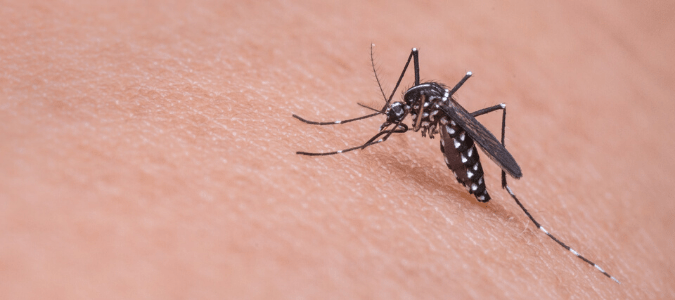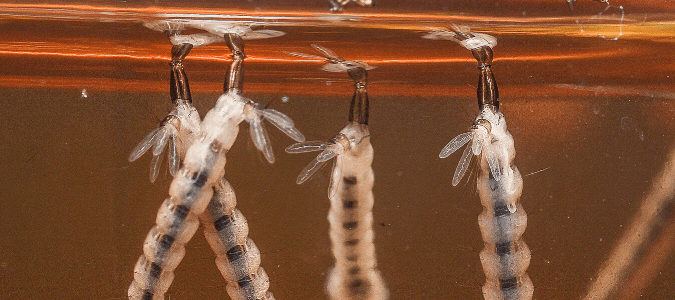Do Mosquitoes Bite During the Day?

There are over 175 different species of mosquito that live in the United States, and each has its own time of day or night when it is most likely to feed on our blood. Several of the most common mosquito species can live in the same regions and have different times of day or night when they’re out looking for their next meal—which means that there may not be a time when you’re completely safe from mosquito bites.
Three mosquito species, in particular, are extremely prevalent in the U.S.:
- the northern house mosquito (also called the common house mosquito), which is most often found in the northern part of the country;
- the southern house mosquito, most often found in the southern states; and
- the Asian tiger mosquito, found in 26 states throughout the country, including Texas.
Northern and southern house mosquitoes are most active at dusk, during the evening and at night, while the Asian tiger mosquito tends to be active more in the morning and late afternoon.
There are more reasons to avoid mosquitoes than just their obnoxious biting habits. These bites are certainly itchy and irritating, and for some, intensely so; some people have allergic reactions to mosquito bites and might develop hives in response to them. Beyond that, mosquitoes are known to carry diseases that are dangerous to humans, such as the West Nile virus and the Zika virus, as well as malaria and dengue fever. These insects are also able to transmit heartworm to dogs and cats, and their bites can cause intense itching and allergic reactions in pets, which in turn can lead to secondary reactions and health problems.
So, how can you avoid these pesky creatures to prevent getting their itchy and potentially harmful bites? If you learn what attracts mosquitoes to your yard, you use this information to make your yard less appealing to these pests. In turn, you will likely have less mosquitoes hiding around your property.
First and foremost, what attracts mosquitoes is moisture. These insects need water in order to survive and breed, and they can lay their eggs in very little water—even just the small amount that collects in puddles or damp piles of dead leaves after a rain. Thus, keeping your yard clear of fallen leaves and other debris is key to controlling mosquito populations, as is dumping out any water that collects in planters, pots, old tires and the like, and resolving any drainage issues on your property so standing water doesn’t develop.
Mosquito season starts when temperatures regularly begin rising above 50 degrees Fahrenheit, and it can last through late summer or fall. In many southern states, this means mosquitoes can be active from March or early April all the way until October or even November. Many people handle the issue by dousing themselves with mosquito repellent whenever they spend time outdoors, but some people may want to avoid these products. Fortunately, there are basic steps you can take to keep mosquito populations low and deter them from wanting to live and breed in your home or yard.
Keeping your yard free of standing water is a big first step. Another important step is to make sure the screens on your windows and doors fit well and are free of gaps or tears, so mosquitoes can’t enter your home through these holes. Keep grass cut low and bushes trimmed, since mosquitoes tend to hang out in tall grasses and underbrush when they aren’t out seeking a blood meal. Inside your home, be sure to fix any water leaks and avoid overwatering your houseplants, so mosquitoes won’t have any place to breed. Regularly dumping out and refilling the water in your pets’ water bowls will also help keep these insects at bay.
While you can control conditions in your own home and yard, you can’t control what your neighbors do. This is why you might have a mosquito infestation even if you take all the right steps to deter them from your indoor and outdoor living spaces. In this case, your best bet is to contact a reputable mosquito control specialist who can inspect your home and yard and develop a mosquito control plan that will target mosquitoes at all stages of the life cycle and incorporate products and techniques that keep your family and pets in mind.
Now that you know that mosquitoes can, in fact, bite during the day, you likely have other questions as well. For example, for those mosquitoes that are active at night, can they see in the dark?

Can Mosquitoes See in the Dark?
If you spend time outdoors in the evening or at night and find yourself itching from mosquito bites, it’s clear these insects are able to find you despite the darkness. So can they see in the dark, and if not, how do they find us at night? The answer has less to do with mosquitoes’ nighttime vision and more to do with their sense of smell.
Scientific researchers aren’t one hundred percent certain about what attracts mosquitoes to humans, but most agree that these insects are drawn to lactic acid, body heat and carbon dioxide. This means they’re attracted to people (and other mammals) that put out higher levels of all three. It is thought that mosquitoes have a sensitive sense of smell that helps them follow the scent of carbon dioxide and lactic acid in the air. Then, once they are relatively close to their human target—within a few feet—they can sense the person’s body heat, which draws them even closer.
Mosquitoes do use their vision to find people to bite as well. Many studies have shown that mosquitoes are more drawn to dark clothing than to light-colored clothes; this is thought to be the case because dark clothing helps mosquitoes spot your silhouette better against the horizon during daylight hours. However, at night, it may matter less whether your clothes are dark or light, since mosquitoes are likely to rely more on smell than vision to find you in the darkness.
If you want to spend time outside at night without being bothered by mosquitoes, wear lose-fitting, long pants and long sleeves if possible, and turn on a fan if you have one, as these insects have a hard time flying in a strong breeze. You can also take a longer-term approach to mosquito control by deterring them from your yard as much as possible, in order to make your outside time—both during the day and at night—more enjoyable.
One of the best methods of pest control for new parents and pet owners is to eliminate potential mosquito breeding areas.

Where Do Mosquitoes Breed?
Mosquitoes need water to breed. These creatures lay their eggs in standing water, and within as little as 24 to 48 hours, those eggs hatch into larvae. Certain mosquitoes need very little water to breed, and can lay eggs in extremely shallow puddles or even damp leaves. This is why it’s so important to eliminate all sources of standing water from your yard, as well as to rake up dead leaves and other underbrush to eliminate all possible mosquito breeding grounds.
When searching for puddles and other standing water around your yard, it’s good to look for obvious spots, such as water that has collected in pots and planters, old tires, bird baths, wheelbarrows and other items around the yard. But also be sure to look in other places, such as in children’s toys, holes in trees or low-lying areas of the yard that may never completely drain after a rain. If you have drainage trouble spots, you might consider doing yard work aimed at regrading the land or installing French drains or other features designed to guide and distribute water where you want it to go.
Still having mosquito problems and at a loss for what to do next? Contact a professional pest control company to help you determine the right steps and provide you with green tips on how to get rid of mosquitoes and keep them away.
Chem-free Can Help With Mosquitoes on Your Property
It’s nearly impossible to eliminate every mosquito in your area, but there are things you can do to reduce your chances of getting bitten by these pests. If you’re looking for low impact and effective mosquito control, get in touch with Chem-free Organic Pest Control. We will make minor modifications to your property to make it less attractive to pests and provide you with mosquito control measures that keep your family, pets and the environment in mind.
Need Help Managing Pests?
Chem-Free offers both effective, low-impact pest control options and preventative measures to help avoid future infestations. Contact us today for a free estimate!


